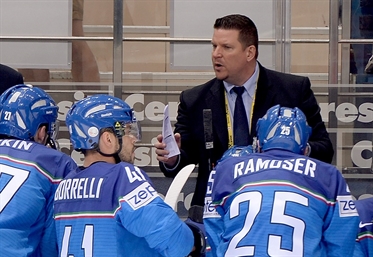Pokel’s pride and passion
Pokel’s pride and passion
U.S.-born Italy coach talks team, career

 Tom Pokel has been coaching the Italian national team since last season. Photo: Richard Wolowicz / HHOF-IIHF Images
Tom Pokel has been coaching the Italian national team since last season. Photo: Richard Wolowicz / HHOF-IIHF Images
Tom Pokel knows that all too well. The head coach of Italy, who doubles as HC Bolzano’s coach, has seen it all in European hockey since he came over from the United States in 1995-96 to step behind the bench in the German second league. At present, the 46-year-old native of Green Bay, Wisconsin is doing everything he can to keep Italy from being relegated to Division I for 2015.
IIHF.com’s Lucas Aykroyd caught up with Pokel after Italy’s 6-1 loss to Canada on Friday.
Is it harder to keep your team on the right emotional level in a game like that when you have so many Canadian-born players facing their native country?
You can see that in the first 15 minutes. There was a lot of pride there, a lot of people back home [in Canada] watching that game on TV, probably. So I think that’s why the frustration levels were there. It wasn’t frustrating in the sense that we were taking stupid penalties. It was frustrating because we were forcing the offence. And when we forced the offence, they were capitalizing on the counters and going the other direction. We need a success. If we keep working at it, the luck is going to come our way. It’s going to bounce our way. It’s going to go down. It’s going to happen.
Right now, that’s the big challenge. It’s my job to keep everybody on the same keel. Stay positive. Stay together as a group, and believe. There are a lot of positive things we can take from the games against the Czech Republic and Canada. The only thing that’s missing are the goals from the chances we’re getting.
How does a guy from Green Bay, Wisconsin come to be coaching the Italian national team?
It’s been a long journey. I finished playing college when I was 23. I tore my knee up, and I got a full-time job offer from the Buffalo Sabres in 1990. I worked for them for five years, till 1995. And then I got the opportunity to go to Germany to be a coach. At that time, the Knox brothers, who owned the Sabres, had both come down with cancer within one year and they sold the team. So I went to Germany and started off coaching.
I coached nine years in Germany, six years in Austria, and this is my fifth year in Italy. Actually, the team that I coach is an Italian team, but it’s playing in the Austrian league, with Salzburg, Vienna, Klagenfurt, Villach, and so forth. And I got the opportunity with the Italian national team a year and a half ago. They fired the coach and they asked me to take over the team. It’s an honour to be able to represent any country at the national team level. So it’s something I take a lot of pride in.
Did you have a plan when you came to Europe?
Just taking it year by year, it just kept moving forward. I stayed over in Europe and now my family – I have a German wife and two boys. We live in Austria full-time and only go back to Green Bay for two weeks in the summertime. I’m a full-time professional hockey coach. It’s been a great honor working with the Italian national team and a great experience facing Canada, Czech Republic, Sweden and all the top countries. I’m learning a lot. I learn every game. I learn every year. Hopefully the career keeps going along. If you’d asked me two years ago if I’d be standing here talking to you right now, I’d never have thought it in a million years.
Did you have connections with Wisconsin coaching legends like “Badger” Bob Johnson or Jeff Sauer?
Not at all. This just kind of zig-zagged and had eyes. My coach, when I played in the USHL, was Bobby Suter. He played for the 1980 U.S. Olympic team. Then I had [ex-NHLer] Jim Wiley as a coach for the Des Moines Buccaneers. But the connections just kind of worked through the Buffalo Sabres, being part of that organization.
One of the guys I played with, Greg Poss, played at the University of Wisconsin. He and I came over to Germany together. I was his assistant coach my first year. Greg Poss and I used to do a hockey school in the summer together back in Green Bay. Then I had an opportunity to get into scouting or get into coaching in Germany. I said, “I can always come back and be a scout, but I can’t always go to Germany.” So I took the German job. I was a history minor in college, and I wanted to see the world. Now I’m seeing the world.
What kind of talent is Italy developing?
We do have some bright stars, if that’s what you want to call them, bright young players. We have players playing in Sweden, Finland. The second goalie who came in, Andreas Bernard, is a young guy from Italy playing in the Finnish elite league. We have Alex Trivellato, an Italian guy, playing for Eisbaren Berlin in the DEL. Joachim Ramoser plays for Salzburg Red Bull. Thomas Larkin is a Columbus draft pick, under contract with Columbus, playing in Springfield in the American Hockey League. So you know, there are a lot of players coming out. For us, six, seven, eight guys, that’s a lot!
We have to do more with what we have, and we can’t let kids quit. We have to keep these kids involved. We have to promote them. We have to have better youth hockey coaches to make sure they’re getting better youth hockey instruction. We can’t just sit back and watch the top players. We have to do whatever we can with the players we have.
What has it been like for you to deal with the cultural differences between Germany, Austria, and Italy?
Germany was my first experience. I was in northern Germany. There are different regions of the country with different dialects and styles, different cultures. The further south I went in Germany, toward Switzerland and Austria and Italy, the more I liked it. The personalities are more similar to North America: a little more open, easy-going, smiling, open to strangers, speaking. In northern Germany, it was a little more conservative, close-minded, not so open.
I really enjoyed the Central European area of southern Germany, Austria, Switzerland, and Italy. Austria tends to be a little more of that mountain mentality. It’s a small country, eight million people, full of mountains. They’re very, very reserved people, very good people, a good economy.
Italy, going a bit south of the border, that was a big challenge. In Germany, it was OK. Austria was an easy slide. Going to Italy was a big change. The area in Italy where I coach is German-speaking. So it’s easy for me. But I coached two teams in the Italy part, and that was culture shock. But in a good way, because the people in Italy are so friendly and open. I can’t say enough good stuff about Italy and the people there. Food, openness, the cities, the shopping, the clothing. How the people come across. You can ask people things in the street and do anything and they’re so friendly and willing to help. But it was culture shock, because everything is different in Italy. It was just a big change for me after being 13, 14 years in Germany and Austria.
With two games remaining against Slovakia on Saturday and Sweden on Monday, what approach do you want your group to take?
For us, it’s getting down. It’s getting narrow. There’s no more time to allow these crucial mistakes that we’re making. [Canadian coach] Dave Tippett said his goal is to get better. Our goal is also to get better for these final games, to pull a win off. And tomorrow [against Slovakia], we need a win. We need a Game Seven, championship game mentality. We need to show and emphasize the good things we’re doing, but we need to stop the bleeding where we’re hurting ourselves with the puck. Maybe have better communication with the players supporting each other and helping each other.
So far throughout the tournament, the team has always responded to what we’ve done. The team has always stayed positive. That was also an indication today. It could have fallen apart and gotten really ugly today, but it didn’t. We stayed in there. Andreas came in and did a good job for us. We wanted to rest Daniel Bellissimo for tomorrow, so there was no point in even having him play the third period, especially with the chances we were giving up. The team responded around that as well, around Andreas. We just need to focus on a couple of things specifically in the offensive zone, where the teams are getting these odd-man rushes against us, because everything else...we put such an emphasis on playing well without the puck, because we knew the teams we’re playing against are better with the puck. We’re done that so well.
Now we have to get better with the puck. That’s our emphasis. We need to grow and make that next 5 or 10 percent jump tomorrow.
Scoring-wise, I’m not putting pressure on the guys to score. It’s going to come. It’s going to bounce. It’s going to go our way. I think we’ve hit eight posts so far. When I say “hitting posts,” I mean where we can go up 1-0, or tie the game against Norway. We’ve hit eight posts. We’re doing everything right that we need to do. We just need the puck to cross the goal line. We can’t get overaggressive and too risky when it doesn’t go our way. Guys are pushing the envelope. They’re going over the border a bit and then we’re getting hurt the other way.
Back to Overview

















































































